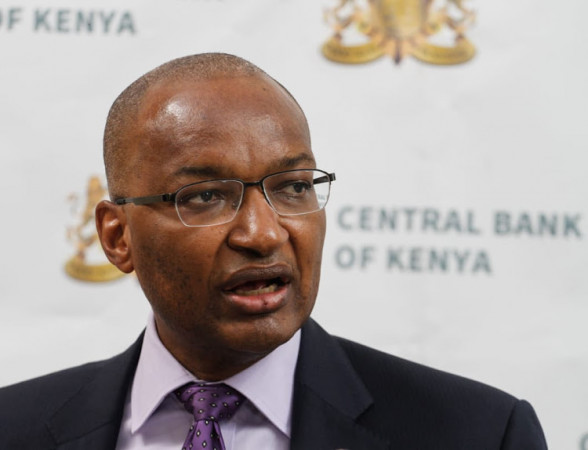Could CBK boss be on way out? Signals point to growing unease

All the telltale signs that Central Bank Governor Patrick Njoroge has fallen out of favour with the new administration are on the wall.
He could be sitting on the edge of his seat since the new government was ushered in last month amid claims by Kenya Kwanza insiders that he has not been supportive of its economic agenda.
Sources within President William Ruto’s administration have told People Daily Njoroge is operating under a dark cloud and that his exit as CBK chief is now a matter of when, not if.
The latest bait that Njoroge appeared to have swallowed line, hook and sinker came from Deputy President Rigathi Gachagua on Monday when he said Kenya lacked sufficient dollars to buy fuel last month. The CBK boss fired back a press statement, before dawn, correcting the DP.
This, sources said, could be one of the issues that could be used to force him out and that he could be the third high-ranking official after Inspector-General of Police Hillary Mutyambai and and DCI boss George Kinoti who resigned last month. Mutyambai said he resigned on health grounds.
In the event Njoroge does not exit, a move could be initiated to have him face a tribunal on charges of “failure to effectively execute his duties”.
With Njuguna Ndung’u — Njoroge’s predecessor — gearing up to take over as Cabinet Secretary for the National Treasury, some State House operatives are already flouting names of former KCB Group CEO Joshua Oigara and Kenya Kwanza’s deputy economic advisor David Ndii as Njoroge’s possible replacements.
On Monday night, Gachagua claimed CBK did not have enough foreign exchange reserves to facilitate importation of oil.
“Why there is forex exchange problem is because of State capture. There was a lot of interest in banks where very senior government people own certain banks and they got involved in this forex business. Central Bank so no longer in charge,” said Gachagua said during a TV interview.
In a rejoinder later in the night, the CBK said it does not supply foreign exchange and that all foreign exchange for private transactions is obtained from commercial banks.
“CBK does not supply foreign exchange for transactions other than for the National Government (government’s own imports or debt service payments) or CBK’s operations,” CBK retorted in a statement.
The Central Bank of Kenya Act (Section 26) requires that CBK “at all times use its best endeavours to maintain a reserve of external assets at an aggregate amount of not less than the value of four months’ imports as recorded and averaged for the last three preceding years.” This stood at 4.64 months of imports as at September 26, 2022,” said CBK.
“The CBK foreign exchange reserves, therefore, continue to provide adequate cover and a buffer against shocks in the foreign exchange market,” the statement said.
The response did not sit well with Kenya Kwanza insiders, with Nandi Senator Samson Cherargei telling off the CBK governor over his choice of medium to respond to the Deputy President.
“Stop responding to our DP Gachagua through social media and media and pressers; its bad manners and ethics,” Cherargei said. “There are better channels to communicate on government issues and it is about respect to the office.”
Dollar inflows
Yesterday, at the burial of Gachagua’s brother, which Ruto attended, Kericho Senator Aaron Cheruiyot, who is also the Senate Majority Leader, reiterated that the government has full confidence in the DP.
“Hon Rigathi is a forthright man who knows what he is saying and should not, therefore, be accused by anybody of saying lies. We have confidence in him,” said Cheruiyot.
Lawyer Ahmednassir Abdullahi, a Ruto supporter, claimed on Twitter that some of the dollars borrowed from international development partners by the previous administration did not find their way to CBK. He did not offer any evidence though.
“In my view, H.E, @WilliamsRuto should not clear both Gov Njoroge and CS Ukur Yatani until all dollar inflows into the country during the last one year are accounted for and CBK reserves are audited,” Ahmednassir said in the Twitter post.
Njoroge’s relationship with the new administration appears to have kicked off on a sour note when President Ruto — during his inauguration — ordered CBK to relax the rules for transactions beyond Sh1 million. The directive was to be implemented without delay.
“In our engagements, traders also complained about the onerous burden involved in cash transactions exceeding Sh1 million,” said Ruto, adding that many traders had reverted to storing money under their mattresses, which was clearly not the intention of anti-money laundering regulations. “While we remain fully committed to mitigating this risk, we believe that there is scope to make compliance less burdensome on genuine business transactions,” he said.
Cash limit
The law mandates financial institutions to keep records of cash transactions of more than Sh1 million and report suspicious deals to CBK’s investigative arm.
Insiders say banks would benefit from the increase in the threshold for reporting but the regulator has been hesitant as complying would breach international obligations, particularly conditions imposed on Kenya by the World Bank and International Monetary Fund (IMF).
The CBK issued a circular in 2016 reminding banks not to relent on prudential disclosures. However, business people have complained that the cash limit has hindered their ability to carry out transactions with ease.
Njoroge downplayed the President’s directive, saying the regulator would not be drawn into taking actions aimed at satisfying political interests.
“The Central Bank will continue with the policies it has always had, regardless of the new administration. In some sense, good central bankers do their work based on data as opposed to political expediencies,” the governor said on Bloomberg.
CBK insiders told People Daily that Njoroge is resisting Ruto’s directive by basing his argument on Chapter 231 of the Constitution that says the CBK “shall not be under the direction or control of any person or authority in the exercise of its powers or the performance of its functions.”
Last week, he found himself out of step with the new government’s general direction. A day after Ruto had presided over a ceremony where borrowers of the digital loan, Fuliza, were freed of the daily maintenance charges for transactions below Sh1,000 in the first three days of borrowing and the cost of mobile phone loans were reduced by half, Njoroge chaired CBK’s Monetary Policy Committee (MPC) that increased lending rate by 75 basis points from 7.5 to 8.25 per cent.
In essence, MPC increased loan repayments to banks, which contradicted the President’s policy to expand the number of Kenyans who can access affordable loans.
Njoroge’s critics also accuse him of not being pro-small businesses in line with Ruto’s policy to spur the growth of Micro, Small and Medium Enterprises (MSMEs), putting him at variance with the new government’s aspirations.
Appointed to office by Uhuru in June 2015, his term was renewed on June 19, 2019 and is expected to lapse in June next year.
When a journalist asked him if he would complete his tenure or throw in the towel early, Njoroge said the question would be best put to Trevor Noah, the outgoing host of a popular US comedy television show.
In his first four-year term, Njoroge won praise as well as criticism over his operations at the helm of CBK. He, however, ensured that the shilling remained fairly stable at an average of Sh101.97 to the US dollar over the period, when most other African currencies had seen double-digit depreciation.
The shilling is now trading at close to Sh120 to the dollar.
During his tenure, the interest cap took root despite resistance from commercial banks who viewed the cap as being in contravention of best practices. The move saw lenders increase their investments in government securities, avoiding small and medium enterprises as well as individuals in efforts geared at minimising risk. The cap was later reviewed.













